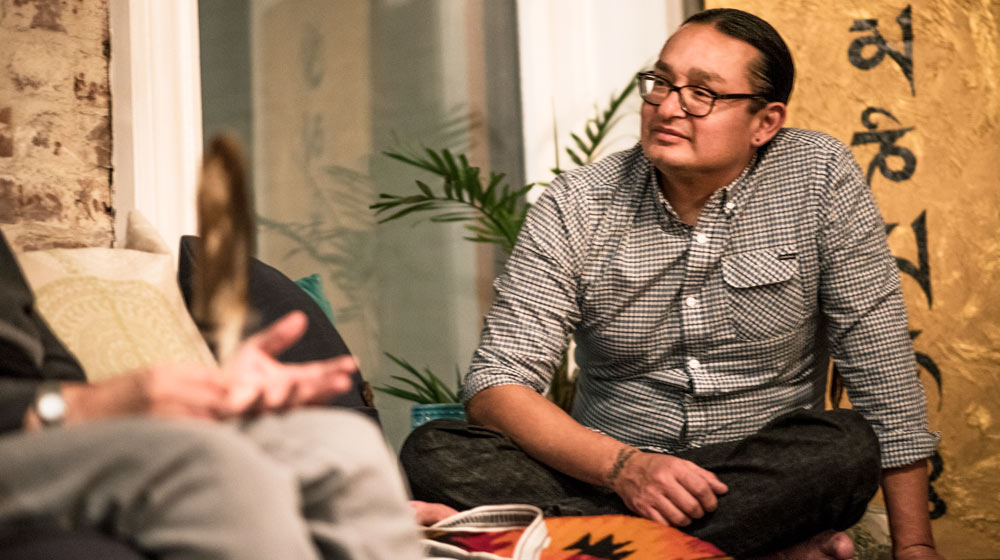No topic is off-limits in Sioux City’s Talking Circle, where Native American spirituality offers healing

Louise* just got back from a 10-day trip to Ireland, and it was lovely. But between walking the cobbled streets and kissing the Blarney Stone, she discovered pain didn’t need an airplane to follow her there.
In a pub, a band played “Danny Boy,” and the beloved Irish ballad brought tears to her eyes. Her son’s name is Daniel. She’s lost contact with him. She suspects that he’s using drugs. And even though he’s grown up and has a child of his own, in her eyes, he’s still her little boy.
Telling this story in the Talking Circle, she starts to cry.
Death, divorce, depression, addiction, health scares, relationship trouble — no topic is off-limits here.
Michael O’Connor, a member of the Ihanktonwan Nation, has been leading the Talking Circle at Be Yoga Studio in Sioux City, Iowa every Monday night since late July 2017. Around 10 people show up each week, including a handful of regulars like Louise and Bob Nelson.
“I come every week because I have found a real connection with people,” said Nelson, a teacher at Be Yoga. “This sacred space has given people the freedom to be able to say things, I think, they desperately want to say, but have nowhere else to say them.”
The weekly meeting aligns with the studio’s mission to “create a community where individuals can come together and be seen, heard and connected.”
Like yoga, there’s a deep spirituality connected to the Talking Circle.
It always begins in the same way — with a prayer, which can be offered to Wakan Tanka, the Great Spirit, Creator, God, Buddha, Allah, the Divine Feminine, the Universe, a higher power, etc. And then, there’s a smudging ritual.
Tonight, it’s a blend of sweetgrass and South Dakota sage, prayerfully picked from O’Connor’s homeland, the Yankton Sioux reservation. In the Native American tradition, smudging is meant to cleanse the spirit, clear negative energy and encourage healing.
“Burning sage makes the Circle holy,” O’Connor says. He uses an eagle feather, a sacred object, to fan the smoldering sage. He moves clockwise around the circle, according to Native customs. On bended knee, he bows his head and holds up an abalone shell smudge bowl to a bunch of non-Natives.
Cupped hands wash the rising smoke over their bodies.
Lapsed Catholics, Christians, Quakers and other spiritual seekers partake in the ritual. Then, someone reads from the book Meditations with Native American Elders: The Four Seasons. Each day features a quote from a Native elder, followed by a reflection and short prayer by the author.
On the Monday before Thanksgiving and Black Friday sales, tonight’s quote is from Mangas Coloradas, an Apache chief, who said, “Money cannot buy affection.”

Dawn* holds the eagle feather and talks about the heart attack she had last week. Everyone else listens in silence. Her yoga practice kept her calm in the throes of a medical emergency, and might have even saved her life, she says. But now, she’ll have to trade her trip to Machu Picchu for funds to cover a hospital bill. All things considered, it’s a small price to pay.
After several minutes of sharing, she passes the feather to Tim*, who’s going through a divorce and facing a custody battle over his two young children. He’s stressed about buying beds and toys to improve the living accommodations for his kids. He feels alone. But he’s focused on bringing goodness into his life and letting go of what no longer serves him.
O’Connor is in the corner, nodding his head.
Other meditations have been about the benefits of laughter; the dangers of “firewater,” meaning alcohol; trees as teachers; spirit beings; and dwellings of the mind (i.e. the house of despair, self-pity, hope, joy, peace). The night’s reading is a jumping-off point. The people who sit in the Circle are free to talk about anything that’s on their mind.
“Sometimes I’ll come and I’ll be like, ‘Oh, it’s late. I wish I was home. I’m tired.’ And somebody will bare their heart and soul out in this Talking Circle, and I’ll be moved to my very core,” Nelson said. “It’s so much like all the yoga principles of finding our center and sharing and being honest. I just see all these things in our Talking Circle.”
Whether it’s intended or not, the Circle becomes an exercise in the yamas, the first limb of yoga that focuses on five guidelines for living a more fulfilling life. Each meeting shows an abundance of satya, which is truthfulness, and ahimsa, which is non-violence toward oneself and others or compassion.
Like a few others in the Circle, O’Connor doesn’t have a regular yoga practice — at least not a physical one. But his truth shines through when he says, “I take the Circle with me. The things I practice here, I like to practice when I leave.”
In that way, he is practicing yoga. Because yoga is so much more than what happens on a mat.
*Names have been changed to protect the privacy of Talking Circle participants.
Ally Karsyn is the founder, producer and host of Ode, a live storytelling series presented by Siouxland Public Media, the NPR affiliate in Sioux City, where she is the arts and culture producer. This article was originally published in YogaIowa’s Winter 2018 issue.


